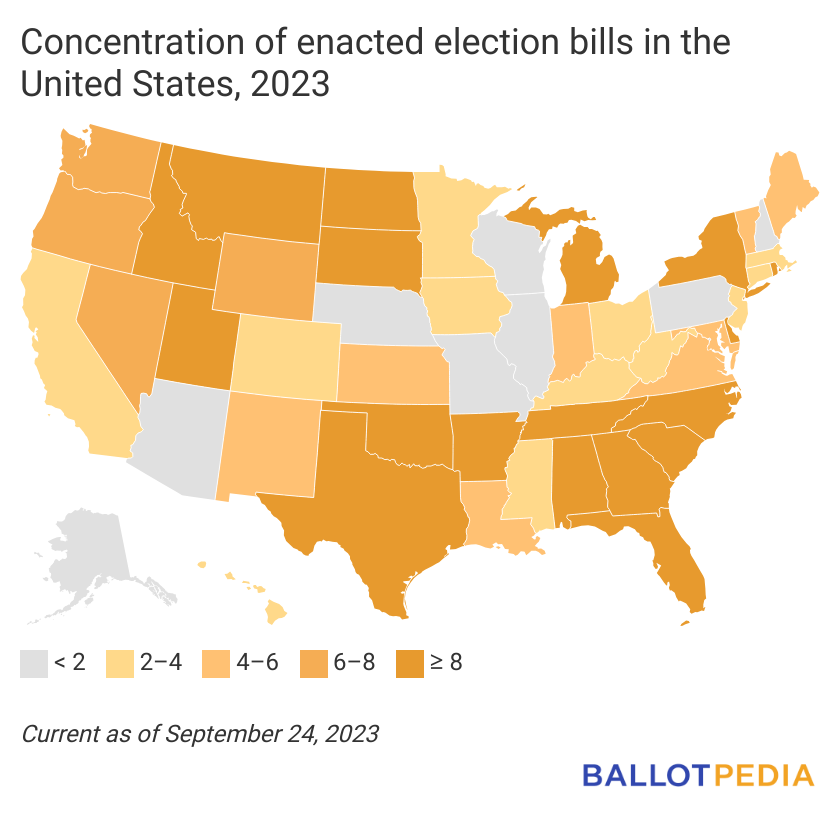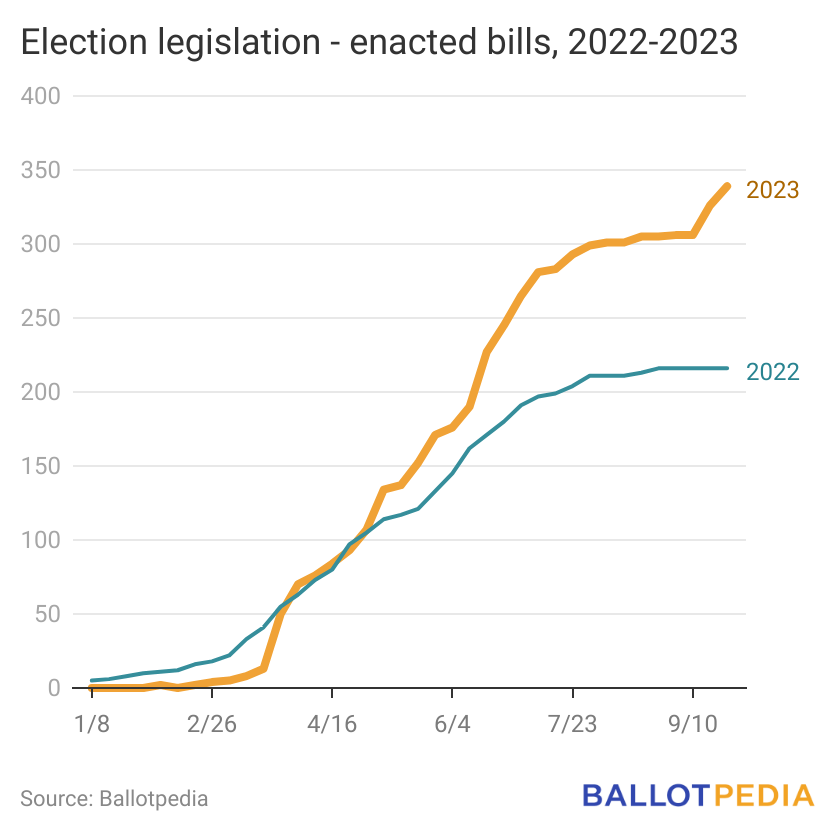As of Sept. 24, members of the General Assembly of North Carolina, which includes the North Carolina House of Representatives and the North Carolina State Senate, have passed 17 bills related to election administration since the beginning of the year. Of those 17 bills, legislators passed two during the week of Sept. 18-24. Republicans sponsored the two bills. The bills are:
-
NC S749: No Partisan Advantage in Elections, Sens. Lisa Barnes (R), Kevin Corbin (R), Warren Daniel (R), Ralph Hise (R), and Paul Newton (R).
- As amended, this bill:
- Arranges for the state board of elections to be administratively placed under the department of the secretary of state, whereas before it was independent of any administrative department.
- Modifies the makeup of the state board of elections from five members appointed by the governor to eight members appointed by the general assembly following specified guidelines.
- Provides the state board of elections members will serve four-year terms, beginning May 1 after the election of members of the council of state.
- Directs that vacancies on the state board of elections will be filled by the general assembly.
- Modifies the number of members required to request to move a meeting to a different location from four to five.
- Click the hyperlinked bill number above for more information.
- As amended, this bill:
-
NC H259: 2023 Appropriations Act, Reps. Jay Adams (R), Dean Arp (R), William Brisson (R), Mike Clampitt (R), John Faircloth (R), Kyle Hall (R), Chris Humphrey (R), Donny Lambeth (R), Jason Saine (R), Larry Strickland (R), William Ward (R), and David Willis (R).
- A summary has not been provided yet.
Of the 17 bills passed this year, 14 have been enacted. Republicans sponsored 11 bills and Democrats sponsored one, while a bipartisan group of legislators sponsored two. Five of the 14 bills are:
-
NC H229: Stagger/Extend Terms of Town Officers/Halifax, Rep. Michael Wray (D).
- As introduced, this bill:
- Amends the charter for the town of Halifax to establish four-year staggered terms for the mayor and commissioners.
- Aligns municipal elections with the general election in odd-numbered years.
- Adds electing these positions on a nonpartisan plural basis in accordance with uniform municipal election procedures.
- Provides for the upcoming election schedule.
- As introduced, this bill:
-
NC H66: Boards of Education Elections, Reps. Jay Adams (R), Jimmy Dixon (R), and Mitchell Setzer (R).
- As introduced, this bill:
- Establishes that the board of education seats will be filled by primary nomination, and elections to be held at the general election. The general election will be held simultaneously with the election of other candidates for county offices. This will be a six member board serving four-year terms.
- Sets that in 2024 board of education seats will move from nonpartisan to partisan positions.
- Allows the other board of education members to fill vacancies through an appointment process.
- Removes a section about a May election for board of trustee members.
- Removes a section allowing same day voter registration for the board elections.
- As introduced, this bill:
-
NC S286: Make Pamlico Bd. of Ed. Elect. Partisan, Sen. Norman Sanderson (R).
- As introduced, this bill requires all persons wanting to be a candidate for the Pamlico County Board of Education to file notice at the same time as candidates for other county offices. Starting in 2024, school board seats will be decided through a partisan election.
-
NC S169: Local Omnibus Changes, Sen. Steve Jarvis (R).
- As amended, this bill provides that Gastonia City Council members will be elected from single-member districts by the voters in those districts, rather than one member being elected from each district by the voters of the whole city. The bill defines the electoral districts as the wards the city council approved on May 3, 2022.
-
NC H57: Harmony/Love Valley Election Changes, Reps. Lindsey Prather (D), Jennifer Capps Balkcom (R), and William Ward (R).
- As amended, this bill:
- Establishes that regular municipal elections in the Town of Harmony will be held at the time of the general election in even-numbered years.
- Establishes that municipal elections in the Town of Love Valley will be held at the time of the general election in even-numbered years.
- Provides that these mayoral and town council elections will be nonpartisan and plurality based, and that elected officials will serve four-year terms with council members’ terms being staggered.
- As amended, this bill:
From Sept. 18-24, legislators passed 16 bills related to election administration nationally. As of Sept. 24, Texas legislators have passed the most bills this year with 35, while Alaska, Missouri, New Hampshire, and Pennsylvania legislators have passed the fewest bills with zero. The state with the most enacted bills is Texas with 33, while four states have enacted none.


The General Assembly of North Carolina was scheduled to be in regular session from Jan. 11 to Aug. 31 this year. In 2022, North Carolina legislators passed one election-related bill in the state House. The bill was not enacted into law. North Carolina is a divided government, meaning neither party holds trifecta control.
Additional reading:







